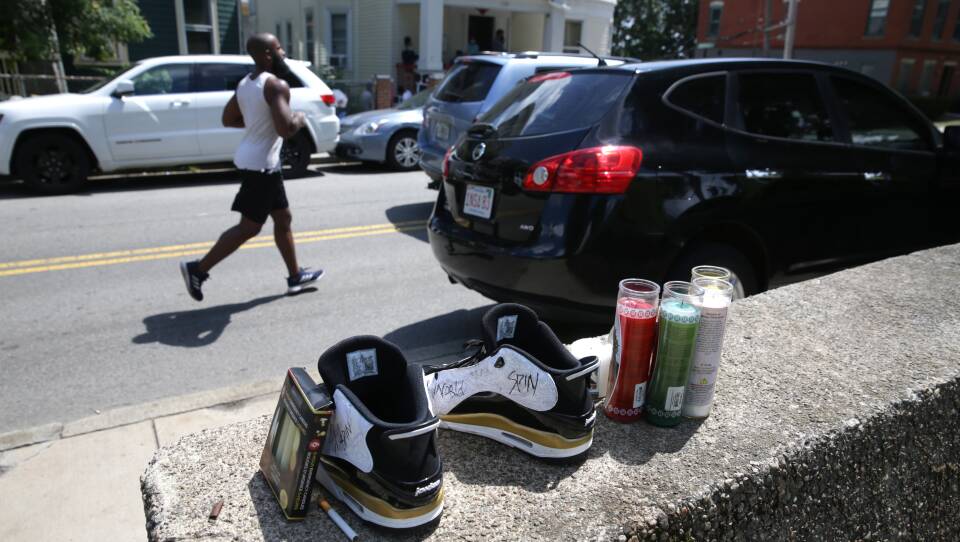Last night, Boston experienced three separate shootings in a one-hour period, leaving five people injured and one person dead. Police are asking for the community's help. “The only thing more troubling is our phones aren't ringing off the hook from people telling us what happened, what they might have seen or heard,” Boston Police Commissioner Michael Cox told reporters Sunday night. “We need the public's help and support on this.”
Jimmy Hills, a community advocate and host of Java with Jimmy, which streams on Facebook Live every morning at 9 a.m., joined GBH’s Morning Edition co-host Paris Alston to talk about his reaction. This transcript has been lightly edited.
Paris Alston: Jimmy, thanks so much for being with us this morning.
Jimmy Hills: Absolutely, Paris. Thank you for being here, you and the team, for raising this as an issue and covering it in a different manner that we've unfortunately seen in some legacy media spaces where there's a certain narrative put into place. Thank you so much for making space for someone from the community.
Alston: Absolutely. And I appreciate you acknowledging that because it's a lot, right? It's not just covering. For you and I both, it's not just hearing about this and reporting it, but it's being affected by these incidents. So with that, I want to ask you first off, how are you doing this morning?
Hills: I didn't know you were going to ask that. That puts me in a very interesting place. I'm hurt. I'm upset. With all due respect, I'm pissed on a few levels. Very upset. And I use that word intentionally. And I believe that is the sentiment of many in the community. I'm also bewildered and have a lot of ambiguity around some of what Commissioner Cox said. I don't know him well. And we didn't see him in the space you and I move in. I heard a timbre of frustration in his voice around the lack of getting folks from the community that unfortunately, we do know a percentage know who these people are or are one or two people away from those — and I'm very specific about saying this — for those that feel that they have no other choice but to shoot, which brings up a whole other myriad of issues around root causes of how we got here.
But one of the major things, Paris, we have to start asking: Guns aren't manufactured in Roxbury, Dorchester and Mattapan. And so while this thing is multifaceted, we also in this advocacy and in trying to figure out what to do next to address the root causes and respond and not react when we're rightfully emotional — we've got to start asking again, where did the gun come from? That is a real question. Massachusetts has some of the most progressive gun laws, but for some reason and somehow, these guns are still making it into close to where you and I live.
"Guns aren't manufactured in Roxbury, Dorchester and Mattapan. And so while this thing is multifaceted ... we've got to start asking again, where did the gun come from? "-Jimmy Hills, host of Java with Jimmy
Alston: Absolutely. And since you brought up Commissioner Cox and his sort of frustration there, I want to play a little bit more of what he had to say last night.
[Previously recorded]
Michael Cox: This is tough. This is getting tough to take. It's more than tough to take. Boston is a great city, but at this rate, if we don't get the public's support, things could change swiftly.
[Recording ends]
Alston: That's interesting, what he's saying there, because obviously he's just a few months into the job right now. We know that he's been a cop for a long time, so he's seen things that have happened on the streets of Boston and elsewhere. But also, with what you're saying about the access to guns, Jimmy, I guess I just wonder. We always hear about this frustration about how people are not coming forward and talking and not helping police solve this. But how much is it on the part of the public to help address this, and why don't people come forward?
Hills: It's interesting being on the other side of the desk. Very loaded question there.
Alston: It wasn't intended to be.
Hills: But believe me, I know how it is. I'll start with what I believe will lead to answering all your questions. We understand in this post-George Floyd period, and prior to, there is a lot of mistrust, a lack of trust within specifically the Boston Police Department. In May of 2020, the national concern rose even more. And so, unfortunately, the public does not have confidence that their information and what they share won't somehow — some of the public, let's say — won't somehow lead to retaliation. There is a culture of this, not snitching. And people really don't realize what the real meaning of that is. And let's just say it, in case somebody is listening. Snitching is not sharing information that someone shot and took someone's life. That's not snitching. And so there's that piece with the public having some concerns about working with law enforcement. And that's real.
"Unfortunately, the public does not have confidence that their information and what they share won't somehow — some of the public, let's say — won't somehow lead to retaliation."-Jimmy Hills, host of Java with Jimmy
I believe that Commissioner Cox, along with Mayor Wu with some of the movements she's making — even with the union contract making that a real public process and so there's transparency. But we didn't get here overnight and so it's not going to change overnight.
So the other piece, again, I heard him [Cox] say something and I heard a cadence in his voice. And a lot of us know this. A few years ago, we were able to say that summer is coming and it's going to get crazy. Since about 2018-19, the winters have been interesting. We saw what happened in 2020, and I heard at the end of that statement that it could, I believe he said, exacerbate or be exacerbated very quickly. And so that is the concern. Holidays are coming, and a lot of people are dealing with the first of losing family members, both from violence and from COVID and other reasons. And so we have to be proactive as a community to attempt to try to figure out a way to work with law enforcement. Because, again, as I said, this is a cultural thing. Somebody knows who walked out the house with that gun, keeping it there. One or two people are away from the person that is shooting. And so if anybody is listening, or an auntie or uncle that knows, or a parent, imagine how you would feel if you lost a loved one. It's not snitching and it's actually for their good and may save their life if you speak up and reach out and talk — and it's a very interesting thing for me to say — reach out and talk with those that investigate how these people are murdered.
Alston: So lastly, Jimmy, where is Boston heading at this point? Have things improved from the last time that we were talking about a spate of violence?
Hills: Interesting question. Boston is heading in a direction where the mayor's office, [Senior Advisor for Public Safety] Dr. Rufus Faulk, the commissioner, community members — the mayor's doing almost like a listening tour to take a sustainable long-term community-lead, but city-supported, with the line through that S, approach to address the root causes of violence. Paris I will tell you, many of us are frustrated with what it takes to build sustainability around such an issue. And a lot of us want to react and we want the mayor to react and we want the commissioner to react and we want others to react. And that's real, from our trauma. When these things begin to happen we ask the community to come out and be involved. Also going back to what Commissioner Cox said — reach out if there's someone from law enforcement in your family, or I believe there's an anonymous line that you can set that set up for people to call.
But the community working with municipality. And I'll say this, Paris too: Where the city is headed is one question. But where we as a people and as a family and individuals — we can answer that around self accountability, community and village accountability as well. And I believe we're headed there. It's taken us to hit rock bottom of the lives that we're losing in such density and the age. But I believe, and I'm critiqued for this often, but I just really believe that there's a different sentiment in the air around sustainable ways to address root causes. And are we on the cusp of needing to react emotionally? Yes. I'm hot. But we need to put that energy into responding.








